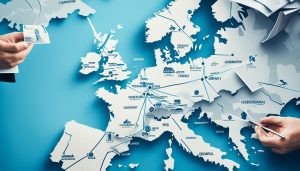Looking ahead to 2025, we see big changes for Europe’s business world. The need for smart planning has never been greater. The European market is changing fast, thanks to new tech, economic changes, and cultural shifts. Companies wanting to stay ahead must quickly adapt and plan.
The European business scene is rich with chances for those who embrace new technologies and consumer trends. These changes are shaping what 2025 will look like. To grow and expand, businesses must weave these new elements into their very fabric.
This article is just the start, a teaser for a detailed guide on thriving in Europe’s evolving business landscape. Companies must focus on innovation and adjusting their strategies to succeed. Staying ahead means being ready to change and innovate.
Economic Forecast for Europe in 2025

Looking towards 2025, Europe’s economy shows a mix of changes. Several important factors will shape its course. For those planning to do business in Europe, insights from top economic groups are key. They help in making smart decisions. Knowing the forecasts for GDP, changes in inflation, and job market trends is vital for planning.
This part sheds light on what the economy might look like in 2025. It helps those investing or starting businesses understand what to expect. Here are the main points to know:
- GDP Growth: We expect growth across many sectors, with tech and green energy leading.
- Inflation Rates: Inflation may go up and down a bit. This reflects worldwide changes and recovery from the pandemic.
- Labour Market Trends: More digital jobs and work from home opportunities will appear. This is part of the digital shift.
Europe’s economic scene in 2025 looks set for interesting times. It’s a period of change that could reshape how people invest in Europe. With the right approach, investors and businesses worldwide might find great opportunities.
Understanding the European Market Dynamics

Exploring the European market shows how consumer trends, supply chain changes, and e-commerce growth shape dynamics. These elements are key for businesses to succeed in Europe. A deep insight into these areas helps in crafting effective strategies and improving market presence.
Consumer Behaviour Trends
European shoppers are now emphasizing sustainability and ethical production. They are well-informed, thanks to digitalisation, affecting how they view and choose brands. This demand is leading businesses to adopt transparent and responsible methods.
Shifts in Supply Chain and Logistics
Enhancing supply chain efficiency is vital for businesses aiming to stay agile during global challenges. The use of AI, predictive analytics, and blockchain is growing in Europe. These technologies help achieve smoother operations and trust, meeting the needs of savvy consumers.
Role of E-commerce in European Trade
The rise of e-commerce is changing European retail. Online shopping is growing, driven by the desire for convenience and fast service. It’s leading to new retail blends, where shops combine online and face-to-face shopping, staying ahead in the market.
Regulatory Changes and Compliance
The business scene in Europe is always changing. Keeping up with the rules is key for staying compliant and ahead. We’ll look into big changes to GDPR, Brexit’s lasting impacts, and new environment laws in Europe.
Preparing for GDPR Adjustments
GDPR rules are getting tighter as the digital world grows. Knowing these changes helps firms meet legal needs and build customer trust. Look out for stricter consent rules, more rights for people, and new data breach alerts.
Navigating Brexit’s Long-Term Effects
Brexit’s business effects are still coming out, affecting different areas in unique ways. Companies must adapt by knowing new trade deals and tariffs. This helps avoid disruptions and find new chances that Brexit brings.
Adapting to Environmental Regulations
Efforts for a greener Europe are changing rules on the environment. Firms must now be more eco-friendly, which means less carbon, better waste management, and cleaner operations. Staying up-to-date with these laws helps firms be responsible and enjoy benefits from being green.
Investment Opportunities in Europe

Europe’s economic landscape is changing fast, becoming rich with different investment chances. This shift is clear in areas where tech advances and market changes are opening up exciting business opportunities.
Emerging Industries and Sectors
Green energy and tech industries in Europe have grown a lot recently. Places in Europe are focusing more on sustainable projects, like wind farms and solar power. This move towards being green is great for the planet and investors alike because of the high demand and government support.
Analysis of European Start-Up Ecosystem
Europe’s start-ups, especially in tech, are thriving. Cities like Berlin, Paris, and Stockholm are buzzing with new ideas, pushing tech forward and shaking up old ways of doing business. These areas are great for investors eager to find the next big thing.
Fintech Innovations and their Impact
Fintech innovations are changing the financial landscape in Europe. Companies that use blockchain, AI in finance, and offer personalised banking are leading the way. These changes make finances easier to handle, safer, and more open, drawing investors to fintech.
Knowing about these trends and sectors can help investors make smart choices in Europe’s varied and fast-moving market. The mix of new ideas, supportive regulations, and market possibilities make Europe an exciting place for investment.
Launching a Business in Europe: A Step-by-Step Guide
Starting a company in Europe needs careful planning and a deep understanding of local laws. This guide is essential for anyone looking to dive into the European business scene.
Setting up a business in Europe involves key steps vital for legality and success. Here’s the crucial info:
- Choosing the Right Country and Legal Form: Picking a country in Europe for your business is critical. What works best depends on your industry, who you’re aiming to sell to, and available funding. It’s important to know what legal structure your business should have, like a GmbH, Limited, or Societas Europaea.
- Registration with Local Authorities: You must register your business with local authorities, which includes giving them your business name, office address, and manager details. This step can’t be skipped.
- Setting Up Financial Infrastructure: Having a bank account is key for your business to handle money, get payments, and sort out taxes. If you’re planning to work across Europe, make sure the bank can deal with international dealings.
- Understanding Tax Obligations: Different European countries have their own tax rules for businesses. Getting advice from tax experts can help you avoid legal issues, making the setup smoother.
- Navigating Employment Laws: If you’re hiring, you need to know local employment laws. This covers contracts, pay, and keeping the workplace safe. Following these rules is crucial.
- Continuous Compliance and Renewal: Businesses must keep their records updated and renew their licenses regularly. Staying informed about legal changes helps keep your company in good standing over time.
By taking these steps to start a company in Europe, entrepreneurs boost their success chances. Knowing and following local business laws is essential for doing well in the European market.
Cross-Cultural Communication and Negotiation

Today’s global market demands effective cross-cultural negotiation in Europe. It’s crucial for business success. Knowing European business customs smooths interactions and strengthens strategic partnerships.
Building a Multicultural Team
A multicultural team brings diverse perspectives that spark innovation and solve problems. Strategies to build such a team include:
- Implementing inclusive hiring to widen talent pool
- Providing intercultural training for respect and understanding
- Encouraging open communication for equal contribution
Understanding European Business Etiquette
Knowing European business etiquette is key for cross-cultural talks. It involves everything from dressing formally to being on time and knowing how to negotiate.
- Always use titles unless told otherwise
- Value face-to-face meetings for stronger bonds
- Learn about the company’s hierarchy and decision-making
Language Skills and Localisation Strategies
Local language skills and fitting your business to local markets are vital. They improve communication and show respect to the local community.
- Learn languages or use translators for clarity
- Customise marketing and websites for local culture
- Get to know local consumer habits and preferences
European Trade Agreements and Implications
Understanding EU trade deals is key for businesses looking to succeed in European international trade. This section examines how these agreements influence market access in Europe.
EU trade deals shape Europe’s economic scene significantly. They open up market access and redefine economic ties between Europe and the world. This section highlights some major impacts of these agreements:
- They affect tariffs and trade barriers, changing how goods are imported and exported within and outside the EU.
- There is a push for regulatory coherence. This makes international business operations smoother under a single legal system.
- These deals promote better cooperation and partnerships, driven by shared economic interests with non-EU countries.
From planning to action, EU trade policy involves input from its members. It aims at benefits for all involved. For businesses, understanding these policies offers a big competitive advantage.
As global conditions shift, so does market access in Europe. Companies that keep up and adapt to EU trade agreements stand to gain a lot. Knowing and using these agreements well can greatly affect a company’s international success.
Utilising Tech Advancements for Business Growth
In today’s fast-paced world, European businesses are tapping into new technologies to grow and become more efficient. Technologies like AI, blockchain, and data analytics are changing how companies operate. These advancements are not just making processes quicker but are also reshaping businesses.
We will explore how AI, blockchain, and data analytics are being used in Europe. These technologies are making companies more innovative and competitive.
Integrating AI in Business Processes
AI is changing how companies in Europe interact with customers and manage work. It makes repetitive tasks automated, letting businesses focus on strategic work. AI also helps in offering personalised customer services, boosting satisfaction and loyalty.
The Role of Blockchain in Securing Transactions
Blockchain is key to making business dealings more secure and transparent. European firms are using blockchain to protect data and prevent cyber attacks. This ensures transactions are safe and builds trust with customers and partners.
Advancements in Data Analytics
Data analytics is vital for making smart business decisions in Europe. It helps companies understand market trends and customer needs. This leads to better products, strategies, and customer experiences, increasing profits and market presence.
Adopting these technologies improves business operations and gives companies a competitive edge in Europe’s dynamic market.
Building Resilience Through Sustainable Practices

Companies across Europe are now focusing on sustainable business models. This is crucial for companies that want to stay ahead and resilient. They’re making ethical choices and going green, which also brings economic benefits. This discussion shows how sustainability can give businesses a competitive edge.
Industry leaders are rethinking what success means. They’re moving towards a circular economy, cutting down waste, and using energy wisely. These steps help European firms be profitable and look after our planet.
- Implementation of renewable energy solutions in production processes, reducing carbon footprints substantially.
- Adoption of recycling practices and reduction of material waste in manufacturing industries.
- Development of sustainable supply chains, ensuring that all operations, from sourcing to delivery, meet high environmental standards.
These efforts fight climate change and appeal to consumers. People now prefer to buy from brands that care about society and the environment. Studies show consumers don’t mind paying more for such products and services.
- Increased customer loyalty and brand value through transparency in sustainable practices.
- Financial incentives like tax reductions, grants, and funding opportunities available for green-certified businesses.
- Long-term cost savings resulting from efficient use of resources and energy.
Giving importance to green initiatives makes Europe’s companies stronger economically. It pushes the whole region towards being more sustainable. By focusing on sustainability, companies show success isn’t just about money. It’s also about contributing to society and the environment.
The Impact of European Policies on Foreign Investments

Europe’s foreign investment policy is always changing, shaping the investment world. Recent changes in European rules have major effects on investing across the EU. These changes relate to trade tariffs, taxes, EU grants, and forming European partnerships.
Analysing Trade Tariffs and Taxation
Trade tariffs and taxes are key to the success of foreign investments in Europe. Tax rules differ across EU countries, affecting investment choices. Investors need to know these differences to increase their profits and lower risks.
EU Funding and Grants for Businesses
- Regional Development Funds: Aimed at boosting growth in all EU areas.
- Horizon Europe: Supports innovation and research.
- COSME: Helps SMEs improve their competitiveness and market performance.
EU funding shows its commitment to help local and foreign businesses grow.
Establishing Strategic Partnerships
Creating strategic partnerships in the EU gives vital benefits. These alliances make entering the market easier, share resources, and make businesses more efficient. Strategic partnerships are smart ways to deal with Europe’s complex market.
It’s important for foreign investors to stay up-to-date with European investment policy changes and use available funds. Building strong partnerships is also key for successful, long-lasting investments in Europe. It helps investors adapt to the economic structures of the region.
Key Financial Centres in Europe
Some cities in Europe play a key role in finance, impacting global markets and Europe’s economy. These cities help us understand financial trends and what the future may hold in finance.
London as a Financial Hub Post-Brexit
Even with Brexit uncertainty, London keeps its place as a top European financial centre. Its financial markets are strong, and it has strict rules and major banks. This helps London keep its global financial power after Brexit.
Frankfurt and Paris: Emerging Competitors
Frankfurt and Paris are getting closer to London in the financial world. They use special offers and improve their infrastructures to attract businesses. This battle helps Europe’s economy grow stronger.
The Role of Eastern European Economies
Eastern Europe is becoming more important in finance. This area is growing its financial services, helped by new technology and more investment from abroad. This growth makes Europe’s financial scene more diverse and its economy more robust.
Case Studies: Success Stories of Doing Business in Europe

We explore the European business scene, looking at success stories that stand out. We cover everything from startups making their mark to companies that became leaders in the European market.
Startup Innovators and Disruptive Enterprises
- In Berlin’s Silicon Allee, innovative tech startups are changing the game, showing how new ideas can lead to success in Europe.
- Amsterdam is seeing the growth of green tech firms. They mix profit with caring for the planet, aiming for a global influence.
Lessons Learned from European Market Leaders
- Paris’s eCommerce platforms thrive by adapting their business to meet changing market demands.
- London’s financial firms lead by focusing on what customers need in a digital age.
Strategies for Scalability and Expansion
Successful companies in Europe use clever tactics to grow and reach new areas. For example:
- They use advanced analytics to spot market trends. This helps them make smart decisions to move into new areas.
- They create a strong brand that respects local cultures. This helps them win over customers both locally and globally.
Learning from these stories and tactics gives companies valuable insight. It helps them aim for leadership in the European market.
Contacting Professional Advisors: Legal and Financial Support

Seeking expert advice in Europe’s complex business world is vital. It helps with following rules, improving money matters, and handling transactions across countries. Teams that offer European business consulting, legal advisories in Europe, and financial advice are very helpful.
If you’re looking to grow your business in Europe or improve your current operations, knowing when and how to use experts is key. Follow these steps:
- Initial Consultation: A first meeting will help understand your needs and goals. It sets up a plan that uses advice from both financial and legal experts in Europe.
- Regulatory Guidance: The legal side of doing business in Europe can be tricky. European legal advisors give important details about local laws that might affect your business.
- Financial Structuring: For tax issues to investment advice, financial experts in Europe help keep your business healthy and in line with European laws.
- Ongoing Support: Help from European business consultants doesn’t stop once your business is set up. Ongoing advice helps your business keep up with market and law changes.
Building a strong relationship with these experts gives your business an edge. It makes your company faster and safer from money and legal problems.
Preparing for Future Challenges in European Markets
As 2025 approaches, European businesses face many challenges. It’s essential for success to future-proof operations in Europe now. This includes adapting to environmental issues, new technology, and updating laws. A strategy focused on insight not only prepares firms but also strengthens their market position for the future.
Dealing with Europe’s complex market requires focusing on environmental care, tech advancements, and understanding laws. Companies must adopt greener operations to meet environmental rules. This is not only good ethics but also draws in both customers and investors. The move towards artificial intelligence and the digital world demands investment in innovation. It also calls for continuous learning to lead in the market. Keeping up with changing laws ensures companies stay legal and avoid problems.
Adopting flexible business tactics means spotting both risks and chances for growth. This could involve forming partnerships or improving how the supply chain works. Being ready helps companies quickly adapt their main goals. By doing this, businesses in Europe can do more than just cope with upcoming challenges. They can prosper in a changing European market and culture. Looking forward, well-made plans for the future will show which companies lead in Europe’s 2025 market.
Contact us
We help businesses register and set up companies in the UK and Internationally, providing specialist support and knowledge. All of our clients are dealt with professionally and with care. With years of experience in helping businesses to expand, we have a variety of services available, including international accountancy & tax services, EMI banking solutions, company secretarial services (CoSEC), merchant service solutions, payroll services and you can also buy a shelf company.
Are you considering setting up a new business or expanding your existing business into another country? If so, why not book a quick call with one of our consultants? From international company incorporations to professional services, we have you covered throughout your business journey. Experience a smooth, simple and fast setup.
Related posts:
 Advantages and Disadvantages of Doing Business in Europe
Advantages and Disadvantages of Doing Business in Europe  Eight tips for doing business in Europe
Eight tips for doing business in Europe  What is Needed to Start a Business in Europe
What is Needed to Start a Business in Europe  Things Americans Need To Know Before Starting a Business In Europe
Things Americans Need To Know Before Starting a Business In Europe  How To Market Your Business In Europe?
How To Market Your Business In Europe?  Starting Your Beauty Business in the UK and Europe
Starting Your Beauty Business in the UK and Europe  Steps of Starting a Business
Steps of Starting a Business  EMI Banking Solutions in Europe
EMI Banking Solutions in Europe  Business Consulting Services in Europe
Business Consulting Services in Europe  How to Start a Successful Business in Europe
How to Start a Successful Business in Europe







